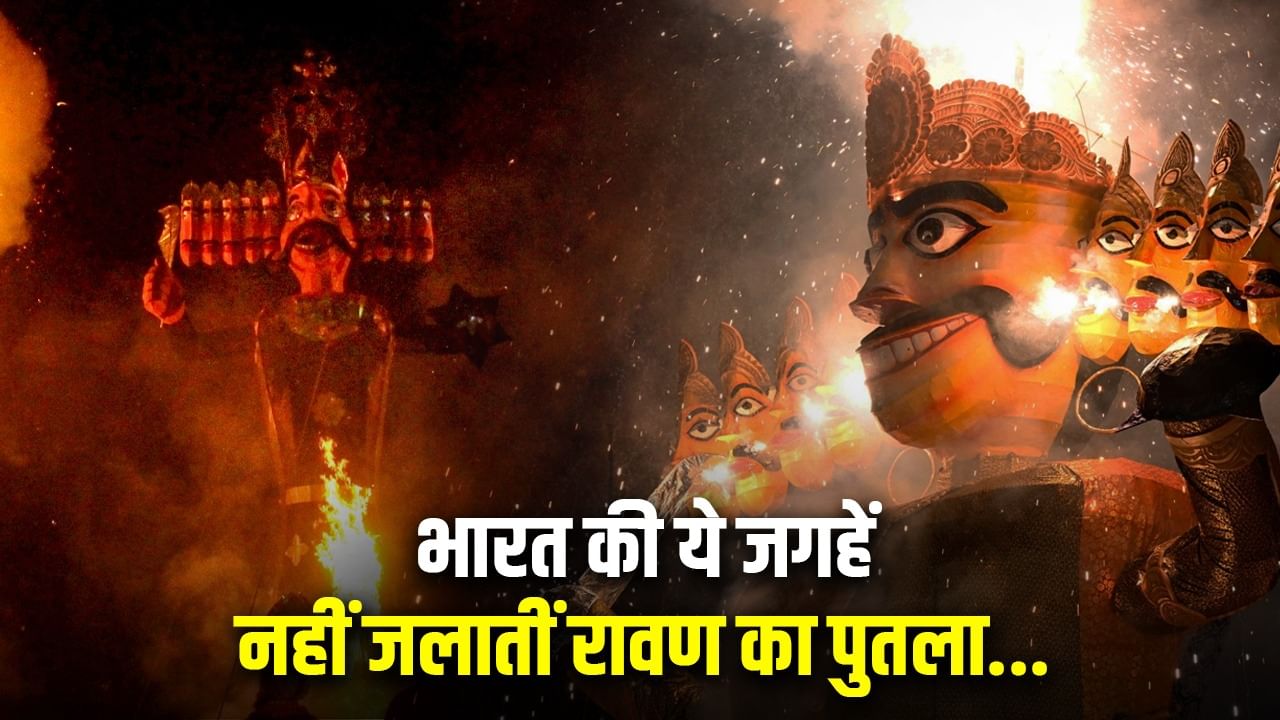Dussehra 2025Image Credit Source: PTI
Dussehra traditions india: The festival of Vijayadashami i.e. Vijayadashami is celebrated with great pomp all over the country. On this day, Ravana Dahan is organized in memory of Lord Shri Ram’s victory. But do you know that there are some places in the country where Ravana is not burnt on the day of Dussehra? Actually, Ravana is not only given respect to Ravana on the day of Dussehra in these places, but he is also worshiped in many places. There are interesting beliefs related to Ravana’s scholarship, Shiv Bhakti and family relations. Let’s know about the major parts of the country where Ravana is not combusted.
The places of India where Ravana combustion is not done…
Mandsaur, Madhya Pradesh: Where Ravana is considered ‘son -in -law’
Dussehra days in Mandsaur district of Madhya Pradesh Ravana Dahan Is not done There is an interesting belief behind it. It is said that Mandsaur Ravana’s wife was Mandodari’s maternal uncle. Due to this, the people of Mandsaur consider Ravana as their son -in -law. This is the reason that burning the effigy of son -in -law is considered inauspicious here. A huge statue of Ravana is also installed here, which is worshiped and mourning his death.
Bisarkh, Uttar Pradesh: Ravana’s birthplace and Nanihal
Ravana Dahan i.e. in Bisarkh village of Gautam Buddha Nagar district of Uttar Pradesh Dussehra The festival of is not celebrated. According to mythological beliefs, this place is considered to be the maternal and birthplace of Ravana. The people of Bisarkha consider Ravana a great scholar and part of their clan. Therefore, instead of burning the effigy of Ravana here on the day of Dussehra, special worship and rituals are performed for the peace of his soul. An ancient temple dedicated to Lankapati Ravana is also established here.
Gadchiroli, Maharashtra: Where Ravana is ‘Kul Devta’
People of the tribal community living in Gadchiroli in Amravati district of Maharashtra worship Ravana. People of this community consider Ravana not only Shiva devotees, but their family deity. They worship Ravana as a symbol of valor and power. This is why in this area Dushehra Ravana is not burnt on the day of the day.
Baijnath, Himachal Pradesh: Shiva devotee’s taposthali
There is no tradition of Ravana Dahan in Baijnath in Kangra district of Himachal Pradesh, but it is worshiped here. According to local beliefs, Ravana did harsh penance to please Lord Shiva at this place. Ravana is considered an ardent devotee of Lord Bholenath, so the people here believe that burning of Shiva devotee gives inauspicious results and it can cause great loss. People here respect Ravana as a great ascetic.
Mandore, Rajasthan: Ravana’s marriage site
Mandore, located near Jodhpur in Rajasthan, is considered to be the marriage site of Ravana and Mandodari. The local people here consider Ravana as their son -in -law and that is why Ravana is not burnt on Dussehra here too. Instead, there is also a tradition of mourning by some communities.
Deoghar, Jharkhand: Ravaneshwar Dham
Baba Baidyanath Dham, located in Deoghar, Jharkhand, is one of the twelve Jyotirlingas, is also known as Ravaneshwar Jyotirlinga. It is believed that Ravana played an important role in the establishment of this Jyotirlinga. Due to the immense devotion of Ravana towards Lord Shiva, people here do not burn Ravana and respect Shiva devotee.
Even though Ravana combustion in the whole country is a symbol of the victory of good over evil, but it is the diversity of India that Ravana is still respected even today due to his knowledge, Shiva, and family relations in some parts. These places show that Indian culture has a tradition to see every character from a different perspective.
Disclaimer: The information given in this news is based on religious beliefs and general information. TV 9 India does not confirm this.
